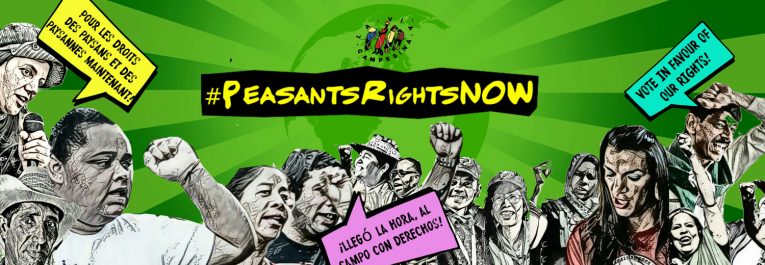“It’s time to transform” LVC welcomes the UN Special Rapporteur’s report on COVID-19 and the right to food

After more than two years, the COVID-19 pandemic is still a reality in our daily lives. More people today still bear the brunt of the pandemic with health restrictions, limited access to markets, worsening hunger and poverty, inequality, and also repression to people’s fundamental rights. During this period, hundreds of millions of people have contracted COVID-19, and over six million people succumbed to death. For peasants and other people living in rural areas, the pandemic has shown the importance of local, peasants’ food systems that are feeding the people and preventing widespread hunger. It is time to transform. The rights of people, dignity, and solidarity, not profits, should be the foundation of the new society post-pandemic.
In similar notes, Michael Fakhri, the UN special rapporteur on the right to food, examines the emerging issues concerning the COVID-19 pandemic and the right to food. The report, entitled “The right to food and the coronavirus disease pandemic” (document A/77/177, available in English, Spanish, French, Arabic, Chinese, and Russian).
In this report, Fakhri summarizes the current situation of pandemic and framing the problem during pandemic times: especially the lack of concerted actions by governments all over the globe and the exacerbated situations done by corporations in putting profits first before humanity. The Special Rapporteur goes further showing the fragility of our general food systems in these pandemic times, highlighting that “[The pandemic] has underlined the value of sharing and solidarity, and the importance of the application of traditional, local knowledge in times of extreme hardship. Communities persevered when they were not exclusively dependent on food value chain operations for their food security. Resilient solutions included localized markets, public food reserves and associated public food distribution systems, mutual assistance and the sharing of food, as well as jut transition to agroecology [as a means for adapting to climate change].”
The report benefited from a series of regional consultations with civil society and inputs from Member States of the United Nations. Therefore it is worth to mention that just transition for workers was raised as one of the solutions for immediate response to the pandemic and the current food crisis, along with upholding land rights and genuine agrarian reform, curtailing corporate power, developing action plans on the right to food based on the principles of solidarity, self-sufficiency, and dignity, addressing debt crisis and financial needs, and ensuring that international trade law and policy create fair and stable markets.
The important report also makes good references to the UN Declaration on the Rights of Peasants and Other People Working in Rural Areas (UNDROP), the United Nations Declaration on the Rights of Indigenous Peoples (UNDRIP), provisions from International Labour Organization (ILO) and United Nations Children’s Fund (UNICEF), also the Food and Agricultural Organization (FAO).
